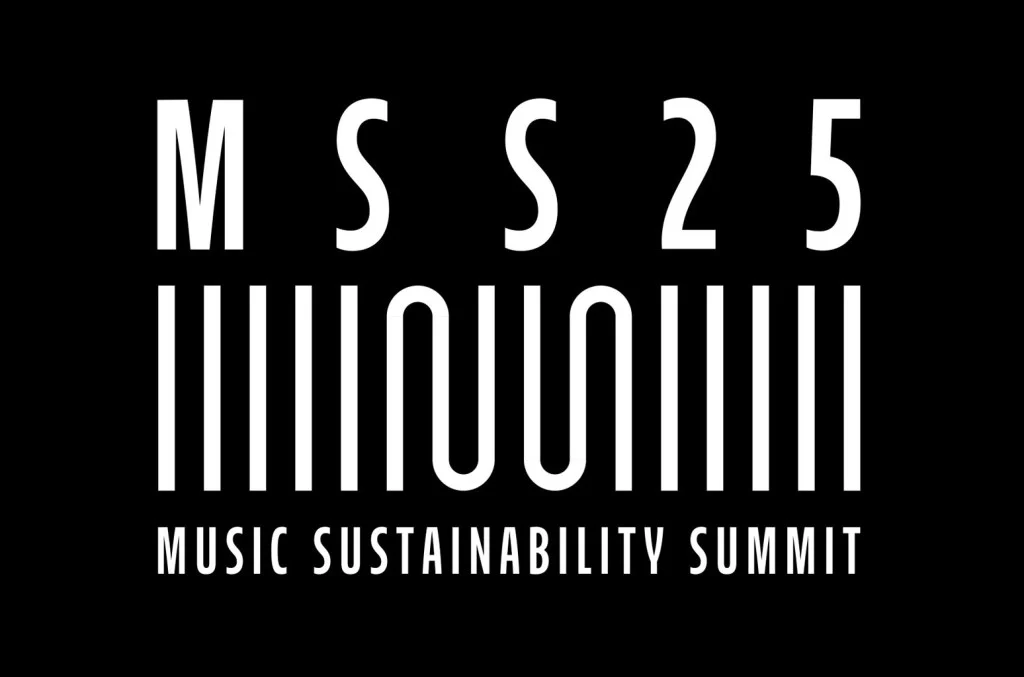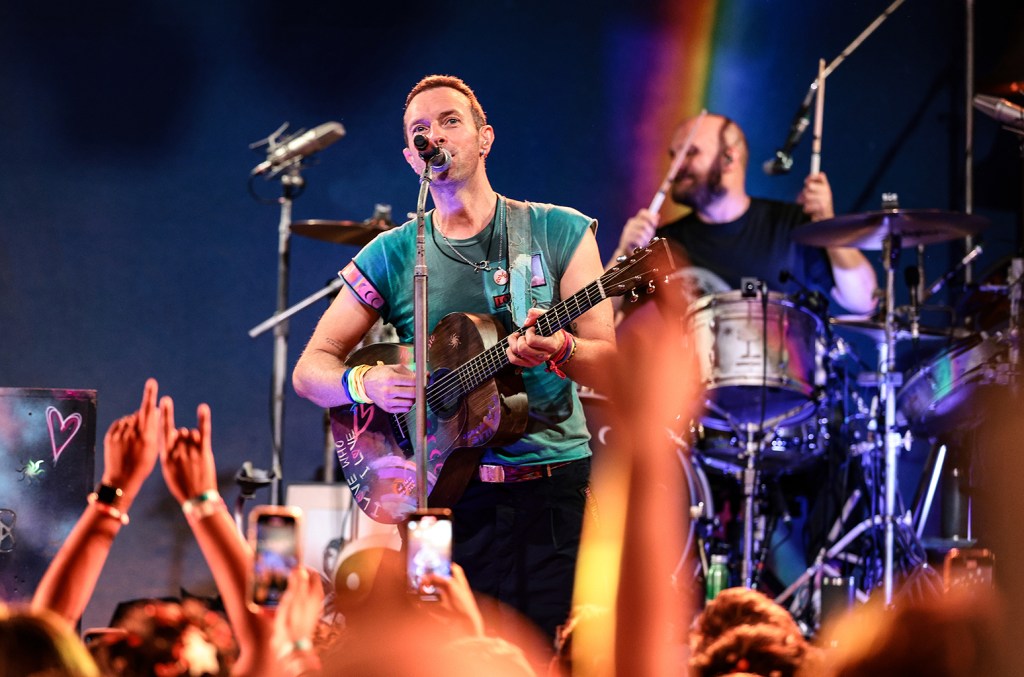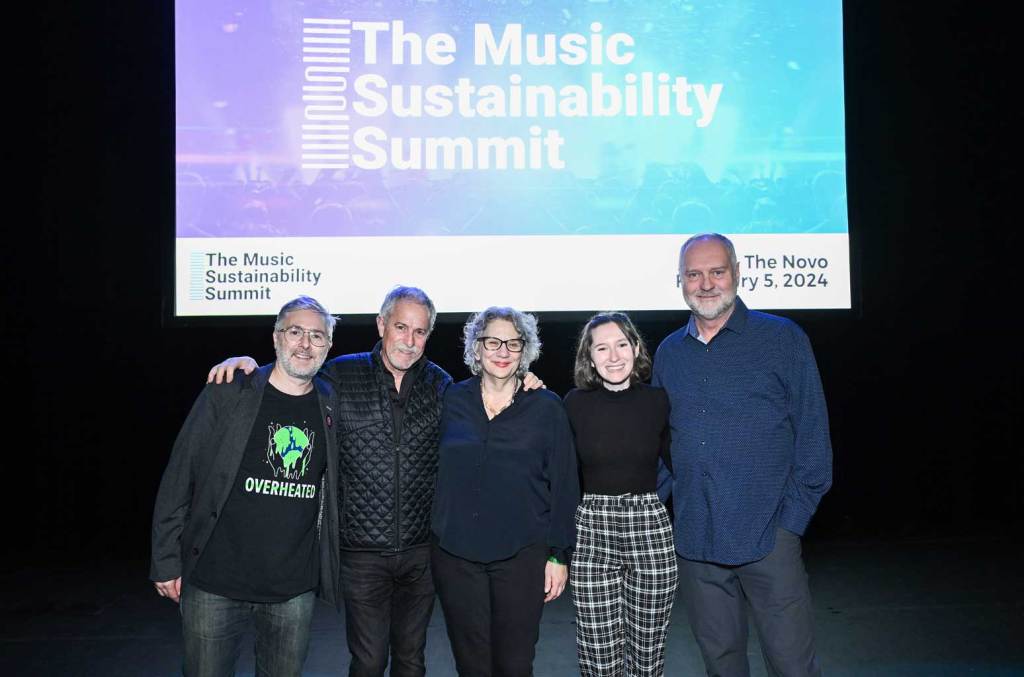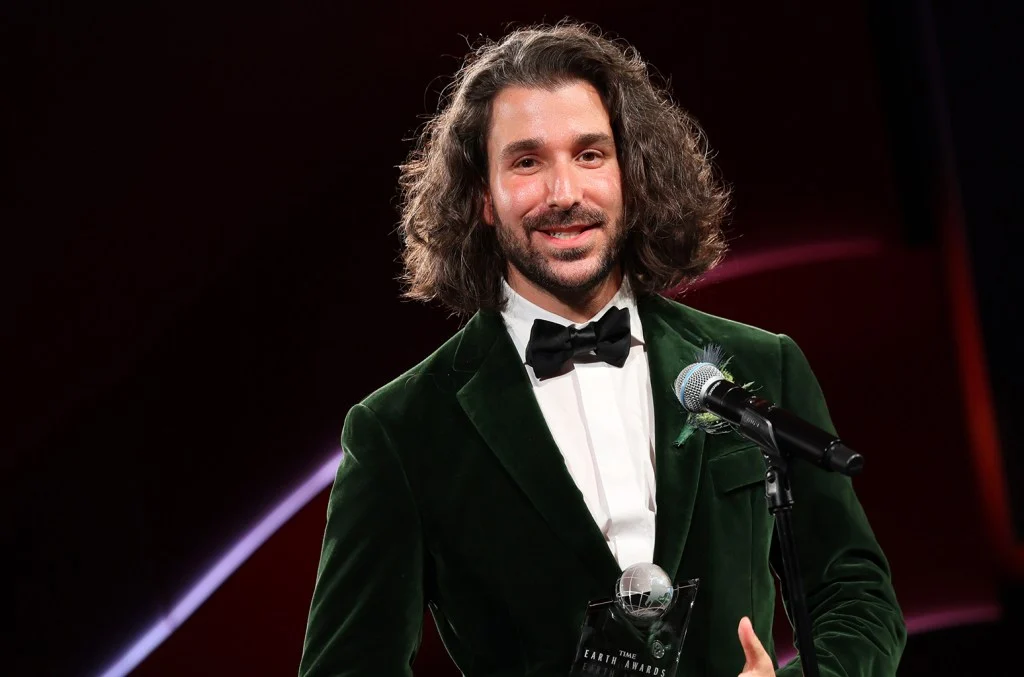climate change
At the inaugural SXSW London taking place June 2-7, with nearly 900 speakers participating in some 500 sessions, one specific topic was of sharp relevance to the music industry — indeed, every industry and every attendee.
The climate crisis.
The past year saw extreme weather drive fires across the music capital of Los Angeles; a cyclone prompt cancellations of some two dozen live events in Australia in a single week; and more than 50 festivals in the U.K. either postponed or canceled due to forces including higher weather-related insurance costs.
“Climate change is not some distant threat,” said Leila Toplic, chief communications and trust officer of Carbonfuture, which provides verification of efforts to remove carbon from the atmosphere.
“The business case for taking action is still there,” remarked Helen Clarkson, CEO of the the Climate Group, a non-profit whiich has worked with more than 500 multinational businesses in 175 markets. (She spoke during a panel provocatively entitled “Canceling Sustainabilty,” about efforts to purse a green agenda in the face of new anti-environmental rhetoric in Washington, D.C.)
SXSW London organizers tapped the Bellwethers Group, which is focused on building a green economy, as its the official sustainability partner and the company hosted several days of panels at the Nature and Cimate House.
One of those panels focused on the role that advertising and public relations agencies can play in guiding businesses which claim to be concerned about the climate. Lameya Chaudhury, head of social impact for the mission-driven creative agency Luck Generals, remarked: “The question we’re asking of clients in 2025 is — did you really f–king mean it?”
SXSW London builds on the four-decade legacy of the South By Southwest music, arts, film and tech conference and festival launched in Austin, Texas, in 1987. Two years ago, Penske Media (the owner of Billboard) took a majority interest in the company which now presents conferences in Austin; Sydney, Australia; and now in the formerly industry district of Shoreditch in East London.
The climate-focused discussion that hit closest to home for the music industry took place Wednesday morning. Billed as “The Future of Sustainable Live Events,” it was moderated by Claire O’Neill, CEO and co-founder of the international nonprofit A Greener Future and co-founder of green energy specialists, Grid Faeries.
Panel participants included Sam Booth, director of sustainability for AEG Europe; Alex Bruford, founder, managing director and agent with ATC Live, whose clients include The Lumineers and Fontaines DC; and Mark Stevenson, co-founder of CUR8, whose mission is to remove 1 billion tons of carbon a year from the atmosphere.
Here are five key takeaways from their discussion.
Follow The Leaders
EarthPercent, the organization co-founded by Brian Eno that works to take on climate change, has hired five new U.S. board members.
This group includes sustainability consultant and former vp of creative at Kobalt Music Emily Bines, YouTube’s manager of artist partnerships Courtney Marr, Los Angeles city council senior communications advisor Dae Levine, Warner Music Group’s new business & ventures rep Michael Delle Donne and longtime industry exec Harry Poloner, who will be the board’s U.S. chairman. Bines will serve as board treasurer, Levine as secretary and Marr and Dalle Donne as members.
“Music has the power to drive real change, and at EarthPercent, we’re using that power to take action on the climate crisis,” Poloner tells Billboard. “I’m honored to serve as board chairman in the U.S. and help mobilize the music industry to protect our planet.”
“We’re very honored to welcome such a strong and driven group to EarthPercent’s U.S. Board,” adds EarthPercent’s co-executive director Joel Gardner. “Their collective passion, experience and stewardship will be instrumental as we further grow our presence and impact across the states.”
Trending on Billboard
Founded in 2021, EarthPercent raises awareness and funding for climate initiatives — both in the U.S. and globally — by empowering artists and the broader industry to take meaningful action on real environmental solutions. Funding is achieved by getting artists and industry members to pledge a small portion of their income to the organization, which in turn directs it to climate-related projects. Funding also comes via partnerships, merch collaborations and individual fundraisers.
The project, which was also co-founded by music managers Adam Callan and Hiroki Shirasuka, has received support from approximately 300 artists and 50 industry organizations and raised approximately $2 million over the last four years. EarthPercent is also a partner of Sounds Right, the cross-DSP playlist that incorporates nature sounds into tracks and directs of a percent of each song’s royalties to conservation projects. “EarthPercent makes it easy for industry and artists to support the earth through music,”” Gardner continues, “and in our first four years we’ve made a real difference to some of the most impactful climate and biodiversity projects around the world.
“This is thanks to nearly 300 artists and 50 industry organizations joining us through pledges in their tours, records and publishing — collectively raising over $2 million. These new appointments are a really positive and exciting next step to further build our movement and unite the power of music in service of the planet.”

Most people might not open their streaming platform of choice and play a track of wave sounds or bird calls. But on the cross-DSP page that lists “Nature” as an official artist, listeners will hear many of Mother Earth’s greatest hits, rarities and B-sides woven into songs from a growing group of musicians making nature-infused music for a good and urgent cause.
Launched in April 2024, this project, called Sounds Right, raises money for conservation efforts by generating royalties from noises credited to “nature.” On Tuesday (April 22), in honor of Earth Day, the multi-genre playlist is adding music from 36 new artists, all of whom have created original songs incorporating elements like the crashing of waves and glaciers, the delicate buzz of moth wings, running antelopes and wildlife in the dense Amazonian rainforest — all recorded out in the field.
Some of the artists involved include U.K. disco pop duo Franc Moody, Belgian techno star Amelie Lens, Indian pop artist Armaan Malik, hip-hop group KAM-BU and Swedish House Mafia’s Steve Angello. A track by I. JORDAN features the call of the U.K.’s rare Lesser Spotted Woodpecker, while London producer Alice Boyd layered vintage 1970s bird songs with present-day recordings to illustrate the natural soundscapes that have been lost to human development. Many of the project’s archival nature sounds were donated by esteemed field recording artist Martyn Stewart and his project, The Listening Planet.
Trending on Billboard
As the music industry grapples with how to mitigate climate change within the sector, Sounds Right’s expansion is another indicator that artists are keen to plug into opportunities to help. Sounds Right global program director Gabriel Smales tells Billboard that many of these artists were recruited by EarthPercent and Eleutheria Group — both Sounds Right partners who reached out to musicians with “what we think is one of the most meaningful creative opportunities in music,” he says. Other artists reached out to Sounds Right directly with a desire to contribute, raise money and, Smales says, “treat the natural world as a partner — a creative force with something urgent to say.”
While the original group of Sounds Right artists mostly remixed pre-existing songs to incorporate wind, waves, birds and more, Tuesday’s addition is largely new music, a shift that Smales says “tells us this isn’t a one-time campaign — it’s becoming a space for genuine artistic and cultural expression.” He cites an ambitious goal of “every artist” making at least one track “with Nature” and says Sounds Right will soon be announcing a way for anyone who’d like to participate to get on board.
A huge incentive to do so? The project is working. The tracks included in Sounds Right’s 2024 launch have racked up more than 100 million streams from more than 10 million listeners, with Smales citing “significant” media interest and social media engagement. In the last year, Sounds Right has raised $225,000 for Indigenous and community-led conservation in the Tropical Andes, an area famous for its biodiversity, with $100,000 coming from royalties and the rest coming from individual and institutional donations.
This money has funded organizations like Colombia’s Fundación Proyecto Tití, which protects critically endangered cotton-top tamarin monkeys and employs locals to steward more than 2,200 acres of regenerated forest. The money from Sounds Right has specifically funded the group’s restoration work with local farmers and the preservation of forest corridors. Meanwhile, money donated to Reserva Natural La Planada is being used to invest in scientific tourism and the protection of biocultural heritage across nearly 8,000 acres of land governed by 10 Indigenous communities in Colombia’s Awá Pialapí Pueblo Reserve.
As more artists contribute and Sounds Right streams grow, royalties are expected to scale “significantly,” says Smales, at which point leaders will invite more donors and match-funders to multiply funding. Smales anticipates committing “far more” funding in 2025 than in 2024 and aims to raise $5 million annually by 2028.
But he says Sounds Right leaders “are under no illusion” that $5 million a year will fix the accelerating horrors of climate change and attendant environmental degradation. Wildlife populations have dropped by an average of 69% in the past 50 years, more than 1.2 million species are currently at risk of extinction and more than two-thirds of the Earth’s land and marine ecosystems have been degraded by human activity. Meanwhile, wildfires, floods, extreme heat and other weather events are affecting delicate ecosystems and displacing humans and animals around the world.
“So far we’ve failed to address the root cause of the biodiversity crisis,” Smales says. “Our economic model doesn’t value nature properly, treating it as a resource to be optimally exploited and a place to dump our waste.” As such, a major goal for Sounds Right is getting people to see nature’s inherent value and recognizing the earth as not just something we use and live on, but as a living entity to protect.
Sounds Right is pushing this message on multiple continents. In Denmark, the project is helping send young people on artist-led nature trips and encouraging them to share 10-second field recordings as part of a #naturesings campaign. In Colombia, Sounds Right partner VozTerra is supporting teachers to train their students in acoustic ecology. A project in Kenya is forthcoming, as is additional music to be added to the playlist in conjunction with World Mental Health Day in October. Ahead of the UN Climate Change Conference in the Brazilian Amazon this November, Sounds Right will spotlight musical “collaborations” with the Amazon and Congo Basins, which together produce roughly 40% of the world’s oxygen and which are targeted to start receiving Sounds Right funding from 2025 onwards.
While climate change is daunting and the world is vast, Smales thinks Sounds Right has huge potential to effect change, given that it meets people in a very personal place: “their ears and the phones in their pockets.” The idea is to create greater interest in and love for nature by putting it in the music we all live our lives to, an awakening Smales hopes will inspire people to do more and to demonstrate the public demand for change to business and political leaders.
“We’re working,” he says, “to go beyond the headphones and build a deeper sense of agency in our collective efforts to protect the planet.”
In conjunction with today’s global celebration of Earth Day, Merlin and IMPALA have announced the launch of a new fund intended to accelerate the independent music community’s push towards sustainability.
The initiative is named the Weidenmüller Sustainability Fund in honor of late !K7 founder Horst Weidenmüller, who co-founded Merlin and was a board member for both the digital music licensing partner for indies and IMPALA, the European organization that represents 6,000 independent music companies spread across 30 countries.
Before he passed away in February at age 60, Weidenmüller was central to the creation of the sustainability program IMPALA launched in 2021. This included the 2022 launch of a carbon calculator to assist labels in measuring and reducing their environmental impact through practices like tracking the climate impact of their office energy and water use, their commuting, their business travel and their manufacturing and distribution efforts.
Trending on Billboard
The new fund will provide resources to further develop and enhance this carbon calculator and make it more globally available, support IMPALA in offering advice and training to independent labels and distributors that use the tool and support the work of the IMPALA task force Weidenmüller created in 2020.
IMPALA has an established history of furthering sustainability. Its 2021 Climate Charter created sustainability frameworks in the indie sector, and in 2024 the company released the results of a study looking at the economic benefits of taking sustainability action. This new joint initiative reinforces a commitment by Merlin in equipping rightsholders with tool to address emerging industry challenges.
“Horst was not only a fierce advocate for independent music, but also for our planet,” Merlin CEO Jeremy Sirota says in a statement. “He believed in driving real and sustaining change—through leadership, innovation, and action. We all have a role to play in the preservation of our planet and a more sustainable future. Merlin is proud to launch the Weidenmüller Sustainability Fund and to help meet our commitment through the incredible work of IMPALA.”
“Horst was a true visionary,” continues IMPALA executive chair Helen Smith. “He believed in the power of collective initiatives as well as the business case or individual action. This fund honors Horst’s profound impact across the whole industry.”
Earlier this month Create Music Group announced its acquisition of !K7, the indie electronic label Weidenmüller founded in 1985. Upon the announcement, !K7 CEO Tom Nieuweboer says the partnership will allow the label “to scale our vision while staying true to our core values of independent artistry, innovation, and quality.”
Of the new fund, Nieuweboer adds that “Horst was my companion, mentor, and friend for decades. His passion for music always went hand in hand with a deep sense of responsibility for our planet which was becoming part of the DNA of !K7. Horst was a true role model – for me personally, and for many across the music industry. The launch of the Weidenmüller Sustainability Fund is not only a tribute to his commitment but also a call to the industry to follow in his footsteps. This fund ensures that his vision will not only be remembered but actively carried forward with real impact.”
How did you get to the last concert you attended?
If you’re like most music fans in the United States and Canada, you probably traveled by car. While taking public transportation would be more environmentally friendly, it’s less likely you went by bus or shuttle.You might be among the few that took the least environmentally friendly option and flew.
Now a new study by REVERB, the longstanding organization focused on sustainability in touring and the broader music industry, is presenting a comprehensive report on all the ways concert attendees get to shows. The study aims to better understand fan travel – long known as the biggest carbon emitter in the live music space – and facilitate solutions to bring down concerts’ environmental impact.
This study was done by REVERB over the last two years at more than 400 shows in over 170 North American cities. REVERB representatives surveyed more than 35,000 fans, asking them about how they got to the show, how they would’ve preferred to get there and the barriers that prevented them from taking a more sustainable travel option.
Out today (April 21), the results of REVERB’s Concert Travel Study aim to give a better sense of the playing field while demonstrating that fans want greener options, info that’s altogether meant to encourage collaboration on solutions among venues, promoters, artists and fans.
Trending on Billboard
The study finds that driving is by far the most common way that fans get to shows, with 80% of respondents reporting taking a car. On average, 3,321 gas powered or hybrid vehicles were driven to any given show. On average, each car went 144 miles roundtrip and carried 2.5 people.
Meanwhile, just 9% of attendees used public transportation, although 33% percent said they would if there were better options available. And while only 7% of fans flew to shows, those flights accounted for 60% of all fan travel emissions.
All in, the study finds that fan travel creates 38 times more emissions than artist and crew travel, tour-related hotel stays and gear transportation combined. The average 11,000 capacity show creates 527 metric tons of fan travel-related carbon emissions, the equivalent of the energy it would take to power 110 homes for a year. On average, even larger concerts create 824 metric tons of carbon emissions.
But 89% of fans would take more sustainable transit options if there were better options and almost everyone surveyed — 90% of participates — said they’re concerned about climate change. See the complete study here.
“We’ve always known that fan travel is the biggest emitter, because you have thousands of fans versus a couple band members or crew members,” says REVERB’s director of impact Madeline Weir tells Billboard. “But the point isn’t to put pressure on fans or say its their fault; we want this to be an opportunity for artists, venues and the industry at large to acknowledge fan travel as the biggest source of emissions and work together with fans to see what solutions would make the fan experience better.”
The study suggests solutions like incentivized carpooling, which would provide better parking spots and expedited exit lanes to fans who arrive with a certain number of people in the car.
Weir also cites a desire to work with the aviation industry to help generate a bigger marketplace for sustainable aviation fuels, in order to bring down the cost of this fuel. Greener air travel is especially crucial when it comes to artist residencies, which typically entail most audience members traveling to see a stationary show.
“We’re never going to say to a band, you shouldn’t do [a residency], because it’s a fan experience and we definitely work with bands that do them,” Weir says. “It’s about talking about solutions with a band and their teams. And a lot of the artists that are at that [residency] scale are already doing a lot for climate, whether it be the offsetting model or more the philanthropy-based model.”
Weir also notes the importance of strategic routing, as emissions are naturally lower when fans travel shorter distances for a show. To wit, when an artist REVERB has partnered with provides the organization with their tour routing, REVERB provides them with information to send out to fans about various sustainable transit options, from carpooling to public transit to bike lanes. REVERB is also partnering with venues to provide tailored data from the study on what each specific venue can do to help fans arrive in greener ways.
The study was co-funded by Billie Eilish, a longtime REVERB partner and of the greenest artists in music. At the Los Angeles and Phoenix dates for Eilish’s Hit Me Hard and Soft Tour this past December, Elish’s team provided shuttles from various park and rides for faster, greener transport to shows, demonstrating that there are straightforward options for artists who want to platform sustainability.
“Artists, venues and fans all need to work together to improve our environment,” Eilish says in a statement. “From solar-powered live shows to more sustainable touring, my team is always looking for ways to help the planet. I have the greatest fans in the world, and I hope this study will be a helpful resource for those looking to learn more about transportation options that cut down on pollution and build a better future for live music.”
REVERB is also helping venues and events look at what Weir calls sustainable “micro-mobility,” including gas powered shuttles, golf carts and other on-site transportation. (She cites Los Angeles’ Intuit Dome as a venue that’s currently enacting such measures.) REVERB is also currently working with Forest Hills Stadium in Queens, NY to create bike valets and promote the use of public transit.
“At Forest Hills, we promote public transit options as the number one way to arrive at the venue,” says the venue’s co-manager Mike Luba. “We love when partners like REVERB and artists amplify this promotion to reduce the number of emitting vehicles driven to our shows. It’s truly better for fans, the community, and us.”
Altogether, the study emphasizes the growing concern about, and push for, sustainability in the industry, with U.S. venues and events increasingly exploring clean energy technology, swapping single-use plastic cups for reusable options and encouraging artists, agents and promoters to incorporate green clauses in various contracts. This work is catching up the sustainability efforts REVERB has been enacting in the live sector since it was created in 2004, with the organization’s co-founder Adam Gardner saying that “listening to fans has always been key to our success.”
While the REVERB study encompasses a lot of data and many options for improvements, what it ultimately makes clear is that demand for greener travel options is significant, with 94% of fans saying they want to be able to take collective action on the issue.
“Venues, artists, promoters and fans themselves all have responsibility to do this together,” says Weir.
This Tuesday (April 15), hundreds of people from across the music industry gathered in Hollywood for the second annual Music Sustainability Summit.
Organized by the Music Sustainability Alliance (MSA), the event again brought together thought-leaders and innovators from the live music, labels, waste management, merch, food, design and production sectors. Panels and breakout sessions — curated around the event’s “progress through collaboration” theme — focused on the challenges and, more crucially, the many solutions that currently exist and can be implemented at scale as the industry takes on the ongoing climate crisis that’s affecting touring, events, the supply chain and the health and wellness of artists, teams, fans and the Earth itself.
“Sustainability is good for the planet and it’s good for business, and it’s being led by the people in this room,” MSA CEO/co-founder Amy Morrison said at the start of the day, “but we’re not done. There’s still more to learn, more to share and more to do. And let’s be honest, this work is only getting more important as some political forces pull back from climate commitments and even try to undermine environmental progress. It’s falling on industries like ours to step up and lead.”
The day began with a stirring performance from singer and environmental activist Antonique Smith and a rousing conversation with activist Reverend Lennox Yearwood Jr., who emphasized the importance of artists and not just engaging in performative activism, but truly engaging with the people who are feeling the very real effects of the climate crisis. “You have to be amongst the people,” Yearwood Jr. told the rapt crowd. “Not only will it make you a better artist, but you will transform yourself by being with the people and feeling the crisis. It will allow you to create art that is divine, that is otherworldly. You will begin to create something that isn’t just pain and depression, but something that could actually change and save this world.
The day of conversations went on to provide huge insights on the many ways the music industry can transition to greater sustainability and do its part in humanity’s greatest challenge, via panel topics that included live music emissions in the U.S. and U.K., why paying attention to menus at venues at events is important, the evolving clean energy sector, strategies that are being used in film, sports and live theater, sustainability in contracts and more.
Here are five things we learned from the conference.
The Music Industry Could Be Greener Through More Strategic Planning

A trio of in-depth environmental impact reports are set to be presented for the first time each at next week’s Music Sustainability Summit in Los Angeles.
Representatives from MIT will be at the event to present their Live Music Emissions in the UK and US report, a comprehensive study of the live music industry’s carbon footprint.
The report aims to create a comprehensive assessment of the relationship between live music and climate change, identify primary areas where the industry and concert goers can make tangible improvements to reduce emissions and provide analysis of the latest developments in green technology and sustainable practices. This study has been co-funded and supported by Warner Music Group, Live Nation and Coldplay.
Additionally, Madeline Weir, director of impact at REVERB will present the longstanding organization’s Concert Travel Study, which highlights concert travel — one of the largest sources of live music-related emissions — and shows how the broad music community can address it through collective action. This report is based on insights from more than 35,000 fans at over 400 shows and offers practical, scalable solutions to create more sustainable concerts.
Trending on Billboard
Finally, representatives from sustainability programs at Columbia University will present a report analyzing current practices, surveying the regulatory landscape and identifying challenges and opportunities related to implementing sustainability practices in venues. An accompanying toolkit will offer tips on how venues can integrate sustainability into their business operations. This report was done in partnership with the Music Sustainability Alliance, with support from OVG and AEG.
The second annual Music Sustainability Summit happens on April 15 at Solotech Studios in Los Angeles. The day-long gathering will offer a robust schedule featuring talks, panel discussions, networking opportunities, performances and more. See the complete program here.
Passes for the Summit are available here. Billboard is the official media sponsor of the event.
“Providing a platform for our partners to present their research at MSS25 is about turning knowledge into momentum,” says Amy Morrison, CEO and Co-founder of the Music Sustainability Alliance. “Whether it’s fan travel, venue operations, or the emissions footprint of live music, these studies help identify where the biggest challenges and the greatest opportunities exist. At MSA, we’re here to ensure the industry has the tools and insights it needs to lead on climate.”
Activist Artist Management has named climate activist Wawa Gatheru its 2025-2027 Foundation Fellow.
As part of the fellowship, Gatheru will receive a $20,000 grant and access to a professional team of pro-bono representatives — including management, publicity, legal, business management, agency representation, partnerships and strategic alliances, digital marketing, and content creation representatives — to further her environment-focused work. Activist will also appoint a pro-bono Fellowship Advisory Council of specialists in relevant areas to support Gatheru’s work.
Funding for the grant comes from Activist Foundation, Inc., a 501(c)(3) nonprofit established by Activist Artists Management to fund advocates and initiatives that protect vulnerable communities and the environment. The announcement comes via Activist founding partners Bernie Cahill and Greg Suess, who serve as co-chairs of Activist Foundation, along with Caitlin Stone Jasper, partner/head of activism for Activist Artists Management. Stone Jasper will also oversee Gatheru’s fellowship.
A Rhodes Scholar and longtime youth climate activist, Gatheru is the founder of Black Girl Environmentalist, a national organization dedicated to empowering Black girls, women and gender expansive people across the climate sector. She sits on boards and advisory councils for organizations including Greenpeace USA, EarthJustice, Climate Power, the National Parks Conservation Association, Good Energy and Sound Future. She was also recently named as a 2025 Sierra Club Trail Blazer Award recipient alongside Quannah Chasinghorse, Bill Nye, William Shatner and Dr. Jane Goodall.
Trending on Billboard
“I am honored and excited to receive this fellowship from the Activist Foundation,” said Gatheru in a statement. “This support is invaluable. It will allow me to expand my work at the intersection of environmental justice and youth empowerment. I am grateful for their belief in my vision, and I look forward to collaborating with the team at Activist to drive meaningful progress toward a more sustainable and just future for all.”
“Wawa is one of the most impressive young leaders I’ve ever encountered,” added Stone Jasper. “Her vision, her voice and her commitment to building an inclusive climate movement are exactly what the world needs right now. Our whole team is thrilled to welcome her to the Activist family and support the powerful work she’s doing.”
The Activist Foundation created the Activist Artists Fellowship in 2020 to support young activists working to create real change on the world’s most pressing issues. Activist Artists clients include The Lumineers, Bobby Weir, Dwight Yoakam, the Grateful Dead, Dead & Company (co-managed by Irving Azoff and Steve Moir), Leif Vollebekk, The Pretty Reckless, Young the Giant, and Michael Franti & Spearhead.
The second annual Music Sustainability Summit has announced the speakers and agenda for the event that’s set to take place next month in Los Angeles. Topics to be discussed during the day-long gathering include: Live Music Emissions in the U.K. and U.S. Behind the Tracks: Music Production, Delivery, and Consumption Beyond Backlash: The High Stakes […]
AJR is transitioning into just JR for 2025. The sibling trio took to social media on Tuesday (March 4) to announce that member Adam Met will be stepping away from live performances throughout the year to focus on his climate efforts. “We’re so proud of what he’s doing in this space,” the band wrote in […]

 State Champ Radio
State Champ Radio 








